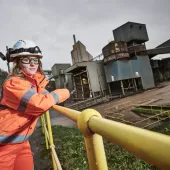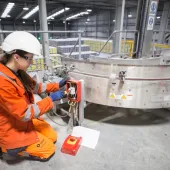The essential role of materials, minerals, and mining
Open letter to university leaders advocates the importance of materials, minerals, and mining
SIX organizations (CMA(UK), IOM3, IQ, MAUK, MPA and MPQC) have signed an open letter to UK university leaders setting out the essential role of materials, minerals, and mining in modern society.
The Critical Minerals Association (CMA (UK)), Institute of Materials, Minerals & Mining (IOM3), Institute of Quarrying (IQ), Mineral Products Association (MPA), Mineral Products Qualification Council (MPQC), and Mining Association of the UK (MAUK) have jointly written an open letter to UK universities to provide evidence-based information about the key role of materials, minerals, and mining in daily life and the transition to a low-carbon, resilient, and resource-efficient society.
The signatories have come together to support informed decision-making and to shine a light on the need for a high-quality education and training pipeline for a skilled, responsible, and sustainable materials, minerals, and mining workforce.
As global demand for the resources required for modern life – including for our homes, transport systems, healthcare, and clean-energy technologies – continues to rise, moving to decouple economies from reliance upon virgin resource use and towards a more circular economy will be crucial. The letter highlights that in the short-to-medium-term, however, this will not be sufficient. As extraction of resources will continue to play a role in meeting society’s demands, it is vital that it is done in a responsible way that considers environmental, carbon, and social impacts.
The letter continues that this will only be possible if we can supply enough people who have the required skills, education, and training, with access to pathways into the industry and awareness of the employment opportunities available.
At the same time, however, there are significant and growing skills gaps along minerals value chains and a decline in education and training provision, as highlighted by the IOM3 report The Talent Gap: Critical Skills for Critical Materials. Together with the CMA (UK) Perception & Engagement Working Group report A Talent Pipeline and the CBI Minerals Group UK Minerals Strategy update, the need to support a robust skills pipeline is clear. The publications set out a number of measures needed to mitigate the growing challenge of accessing skilled professionals, as well as showcasing career opportunities that exist in the value chain.
The letter signatories collectively aim to combat misinformation and decision-making that is inconsistent with the need to increase sustainability and address the climate crisis. They work to raise the standards and professional competence in materials, minerals, and mining, and support industries in driving environmental, social, and governance best practice.
CMA (UK) founder and chief executive officer Kirsty Benham said: ‘If the UK wants to develop expertise, innovation, and new businesses for critical minerals supply chains, it needs to build a talent pipeline of people skilled in geosciences, engineering, metallurgy, and local planning. Building a talent pipeline is vital to ensuring that we have the skills and expertise needed to solve the innovation challenges of tomorrow and to meet the demand required to sustain modern society.’
IOM3 chief executive officer Dr Colin Church said: ‘There is a real need for evidence-based decisions, especially when it concerns our future. If we want to transition to a low-carbon, resilient, and resource-efficient society, the responsible mining of metals and minerals is essential. This in turn means we need skilled professionals with high-quality education and training to do the work, and universities play an important role in this.’
IQ chief executive James Thorne said: ‘The mineral products sector provides the critical building blocks to support society and the economy. The sector is playing an essential part in delivering the sustainable low-carbon transition that is needed. It is vital for the higher education sector to support our ongoing development through innovation, research, and building the skills needed to drive our industry forward.’
MAUK’s president, Andrew Fulton, said: ‘For the UK’s mining sector to establish, demonstrate, and lead global best-practice standards in environmental, social, and governance (ESG) and the achievement of broader sustainability, the education and training of skilled professionals is a necessary investment. It is so very important that all generations develop a clear understanding of the connection between consumer products and the mining industry, and how they can use this understanding to play a meaningful role in tackling climate change. To enhance this, we must all embrace our national value for open, transparent, and objective debate.’
MPA chief executive Jon Prichard said: ‘It is essential that UK universities continue to offer the educational programmes that equip graduates with the knowledge to support the net-zero journey for sectors such as the mineral products industry, which underpin the fabric of society. Mineral products literally provide the foundations for infrastructure and housing, while also being fundamental to the solutions that will deliver climate change adaptation.’
MPQC chief executive Viv Russell said: ‘Universities and Higher Further Education establishments are essential to creating a future sustainable workforce providing essential minerals for our society and meeting the challenge of a zero-carbon future.’










